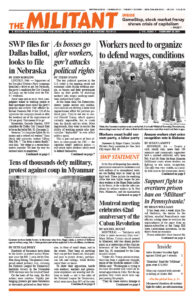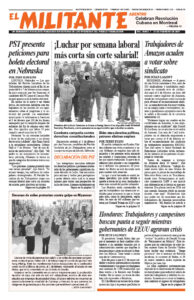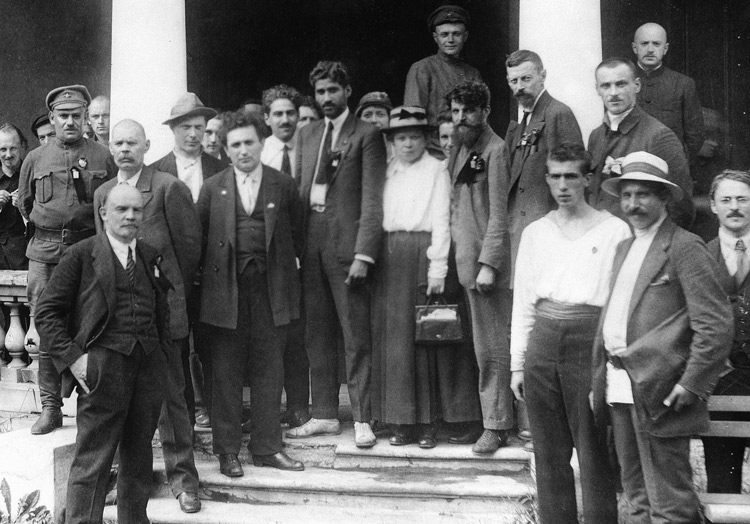The Spanish edition of Lenin’s Final Fight: Speeches and Writings 1922-23 is one of Pathfinder’s Books of the Month for February. In the final months of his active life, Vladimir Lenin, the central leader of the world’s first socialist revolution, led a political battle within the leadership of the Communist Party of the Soviet Union. At stake was the continuation of the internationalist proletarian course that brought the Bolshevik-led workers and peasants to power in October 1917. This was threatened by a rising bureaucracy within the state and party led by Joseph Stalin that resulted in a political counterrevolution after Lenin’s death. Part of this fight was over integration as equals into the Soviet Union of former oppressed peoples of the “prison house of nations” under the regime of the czar. The excerpts are from a letter to the party congress and an earlier memo to the political bureau. Copyright © 1995 by Pathfinder Press. Reprinted by permission.
BY V.I. LENIN
December 30, 1922
I suppose I have been very remiss with respect to the workers of Russia for not having intervened energetically and decisively enough in the notorious question of autonomization, which, it appears, is officially called the question of the union of Soviet socialist republics.
When this question arose last summer, I was ill; and then in the autumn I placed too much hope on my recovery … giving me an opportunity of intervening in this question. However, I did not manage to attend the October plenary meeting (when this question came up) or the one in December, and so the question passed me by almost completely. …
It is said that a united apparatus was needed. Where did that assurance come from? Did it not come from that same Russian apparatus which, as I pointed out in one of the preceding sections of my diary, we took over from tsarism and slightly anointed with Soviet oil?
There is no doubt that that measure should have been delayed somewhat until we could say that we vouched for our apparatus as our own. But now we must, in all conscience, admit the contrary; the apparatus we call ours is, in fact, still quite alien to us. It is a bourgeois and tsarist hodgepodge. There has been no possibility of getting rid of it in the course of the past five years, given the lack of help of other countries and given that we have been “busy” most of the time with military engagements and the fight against famine.
It is quite natural that in such circumstances the “freedom to secede from the union” by which we justify ourselves will be a mere scrap of paper, unable to defend the non-Russians from the onslaught of that really Russian man, the Great Russian chauvinist, in substance a rascal and a tyrant, such as the typical Russian bureaucrat is. There is no doubt that the infinitesimal percentage of Soviet and sovietized workers will drown in that tide of chauvinistic Great Russian riffraff like a fly in milk.
December 31, 1922
In my writings on the national question I have already said that an abstract presentation of the question of nationalism in general is of no use at all. A distinction must necessarily be made between the nationalism of an oppressor nation and that of an oppressed nation, the nationalism of a big nation and that of a small nation.
In respect of the second kind of nationalism we, nationals of a big nation, have nearly always been guilty, in historic practice, of an infinite number of cases of violence; furthermore, we commit violence and insult an infinite number of times without noticing it. It is sufficient to recall my Volga reminiscences of how non-Russians are treated; how the Poles are not called by any other name than Polyachishka, how the Tatar is nicknamed Prince, how the Ukrainians are always Khokhols and the Georgians and other Caucasian nationals always Kapkasians. …
That is why internationalism on the part of oppressors or “great” nations, as they are called (though they are great only in their violence, only great as Derzhimordas1), must consist not only in the observance of the formal equality of nations but even in an inequality, through which the oppressor nation, the great nation, would compensate for the inequality which obtains in real life. Anybody who does not understand this has not grasped the real proletarian attitude to the national question; he is still essentially petty bourgeois in his point of view and is, therefore, sure to descend to the bourgeois point of view.
What is important for the proletarian? For the proletarian it is not only important, it is absolutely essential that he should be assured that the non-Russians place the greatest possible trust in the proletarian class struggle. What is needed to ensure this? Not merely formal equality. In one way or another, by one’s attitude or by concessions, it is necessary to compensate the non-Russians for the lack of trust, for the suspicion and the insults to which the government of the “dominant” nation subjected them in the past. …
[N]othing holds up the development and strengthening of proletarian class solidarity so much as national injustice. “Offended” nationals are not sensitive to anything so much as to the feeling of equality and the violation of this equality, if only through negligence or jest to the violation of that equality by their proletarian comrades. That is why in this case it is better to overdo rather than underdo the concessions and leniency towards the national minorities. That is [in] the fundamental interest of proletarian solidarity and consequently of the proletarian class struggle.
Memo to the political bureau
October 6, 1922
I declare war to the death on Great Russian chauvinism. I shall eat it with all my healthy teeth as soon as I get rid of this accursed bad tooth. It must be absolutely insisted that the union Central Executive Committee should be presided over in turn by a Russian, Ukrainian, Georgian, etc.
Absolutely!
Yours,
Lenin
- Derzhimorda, a policeman in the play The Government Inspector by Russian writer Nikolay Gogol, personified the rude, arrogant state functionary.


